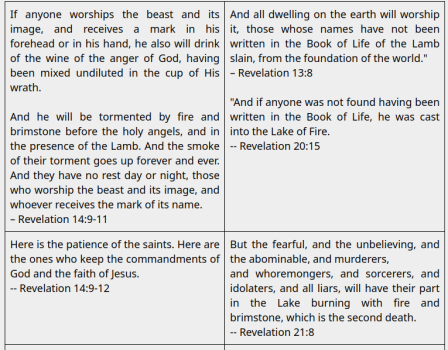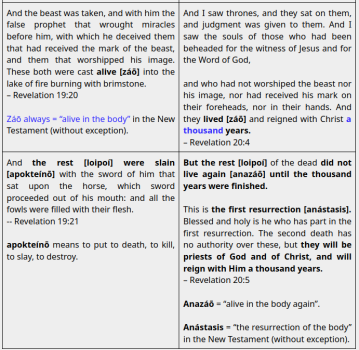CadyandZoe
Well-Known Member
We don't yet have that life. It remains a hope for the future.Solomon tells us the spirit returns to God who gave it, and we learn from Christ that life we receive from Him is everlasting and shall never die.
His spirit both marks us as his, and is an earnest of our inheritance.Christ knew that all mortal flesh is destined to die, so the life we receive from Him that is everlasting and shall never die is life we have through His Spirit within us.
We don't have everlasting life until we receive our glorified body.And we read that when we have the Spirit of Christ within He will not leave us, but give us everlasting life until redemption of our body, that which Christ purchased through His atoning blood.
Essato. We have an earnest of our inheritance. We don't yet have the inheritance.Ephesians 1:13-14 (KJV) In whom ye also trusted, after that ye heard the word of truth, the gospel of your salvation: in whom also after that ye believed, ye were sealed with that holy Spirit of promise, Which is the earnest of our inheritance until the redemption of the purchased possession, unto the praise of his glory.
Where does he say this?Paul tells us that when our natural physical body, of flesh like the first Adam dies, the body raised is a spiritual body like that of Christ that is heavenly/celestial and according to Christ shall be as are the angels of God in heaven.
I don't agree with your interpretation of 1 Corinthians because Paul isn't talking about a body of believers in that passage.Paul says this is true because their is both a natural, physical body, and a spiritual body of believers. That which is called a natural body of believers is of the earth, and that which shall come after the physical body dies is not natural, being supernaturally alive through Christ's Spirit in us.
In what way will we be like it was when God created mankind?On the new earth where we shall be when we are physically resurrected immortal & incorruptible when the last trumpet sounds will be flesh & bone, it will not be spirit. I believe we will then be as we were when God created mankind. Having physical body of flesh & bone, with a breath of life (spirit within) and once again we shall be living souls fit for everlasting life on the new earth.
Where does Paul talk about being spiritually present with the Lord?Paul gives a little more clarity for his belief that he would be spiritually present with the Lord after his body dies.
Jesus says he will prepare a place for his disciples. The question is whether on earth or in heaven.If Christ were talking about His disciples being with Him when He is glorified, why does He tell them they would be with Him where He is?
John 14:1-4 Do not let your heart be troubled; believe in God, believe also in Me. In My Father’s house are many dwelling places; if it were not so, I would have told you; for I go to prepare a place for you. If I go and prepare a place for you, I will come again and receive you to Myself, that where I am, there you may be also. And you know the way where I am going.
When Jesus returns, he will return to earth. Therefore, his Father's house will be on earth, the dwelling places will be on earth, and he will live with them on earth.
The method and mode of preparation will involve Jesus' ascension to offer his blood in the heavenly temple and intercede for his followers. He will also receive a kingdom from the Father. And so, when Jesus comes again, all preparation will have been made for his kingdom on earth. Jesus is praying to the father that the twelve will be there when he returns.
He had to go to heaven to fulfill the prophecies concerning the establishment of his dominion. Refer to Daniel 7, and Psalm 110.For that matter why did He say He was going to the Father to prepare a place for them?
Jesus didn't say that after death we are like the angles. He said that after being resurrected, we will be like the angels.Why also when speaking of His resurrection did Christ tell the seven brothers who questioned Him about the resurrection that after physical death we are as the angels of God in heaven, and in the resurrection the dead are raised up like Abraham, Isaac and Jacob now are, because God is not the God of the dead, but the God of the living?
You raise a good point about Abraham, Isaac and Jacob. What does he mean when he says that God is the God of the living? Does me mean that Abraham, Issac, and Jacob are alive? Since Jesus is talking about the resurrection, we have two possible, plausible interpretations. God already resurrected these men, or God plans to resurrect them in the future. Either way, it proves the concept of resurrection, which was to be proved.



